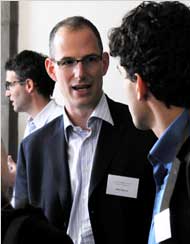News
Forum to Explore Incomplete Contracts
The Chicago Forum on Contracting will host a talk called "Rethinking Incomplete Contracts" by Oliver Hart of Harvard on Thursday, Nov. 11. Hart, the Andrew E. Furer Professor of Economics at Harvard University, will speak at 4–5:30 p.m. in Room C25 at the Charles M. Harper Center, Chicago Booth School of Business.
The Chicago Forum on Contracting brings together scholars across departments and disciplines for collaborative exploration of the foundations of contracting and evolving questions of contract theory. It is sponsored bythe University of Chicago Booth School of Business and the Law School. For more information, call 773.702.0220 or e-mail Marjorie Holme.
Goolsbee to Chair Council of Economic Advisers
President Barack Obama has named Austan Goolsbee to be the chairman of the White House Council of Economic Advisers. Goolsbee, the Robert P. Gwinn Professor of Economics at the University of Chicago Booth School of Business, advised the Obama campaign on economic matters and joined the council in 2009. He also serves as staff director and chief economist for the President's Economic Recovery Advisory Board.
Announcing the appointment on Sept. 10, the president said, “He's not just a brilliant economist. He's someone who has a deep appreciation of how the economy affects everyday people and he talks about it in a way that's easily understood.”
Goolsbee's research interests include the new economy, government policy, taxes and technology. He is currently on leave from the University.
- See Harvard economist Edward Glaeser's comments on the choice »
Global Rebalancing Needs a Fan Base
The International Monetary Fund is the ideal organization to rally public support for rebalancing global trade, Raghuram Rajan writes in his latest Fault Lines blog post. The world economy is in desperate need of fiscal rebalancing, but world leaders are unlikely to make the hard choices needed to restore more balanced trade. That's because there's no clear constituency calling for reform.
What's needed, Rajan says, is a bottom-up movement to convince political leaders that there is domestic support for significant policy change. Grassroots movements and nongovernment organizations have demonstrated the power of the internet and social networking to influence political leaders on key causes. Unfortunately, rectifying global trade imbalances is not a cause likely to tug at public heartstrings, and no organization stands ready to take on the cause.
The IMF could do the job, Rajan says. If it steps up its public relations game, he writes, “the IMF could have far more impact on global macroeconomic policy, especially policies followed by countries that do not need its loans, than it does today.”
Beijing forum explores China's economic development
Gary Becker and James Heckman, members of the MFI Faculty Steering Committee, joined Thomas Ginsburg of the Law School in Beijing Sept. 15 for a panel exploring economic development and the rule of law in China. The panel was part of a forum marking the opening of the University of Chicago's Center in Beijing.
Also participating was Justin Yifu Lin (PhD '86), chief economist at the World Bank. Yue-Chim Richard Wong, (A.B. ’74, A.M. ’74, Ph.D. ’81) of the University of Hong Kong moderated the panel.
The panel was part of a forum featuring University President Robert J. Zimmer and the presidents of four Chinese universities, who came together to discuss opportunities arising from the globalization of higher education and academic collaboration across borders. One of three core areas of focus for the new Beijing center is business, economics, and policy.
During the opening events for the center, Becker and Heckman also spoke at a Nobel Laureates’ Forum held in famed Great Hall of the People in Tiannamen Square. They joined fellow laureates Roger Myerson (Economics, 2007); James Cronin (S.M. ’53, Ph.D. ’55, Physics, 1980); and Chen Ning Yang (Ph.D. ’48, 1957) in a discussion of their work and how it reflects the spirit of the University of Chicago.

